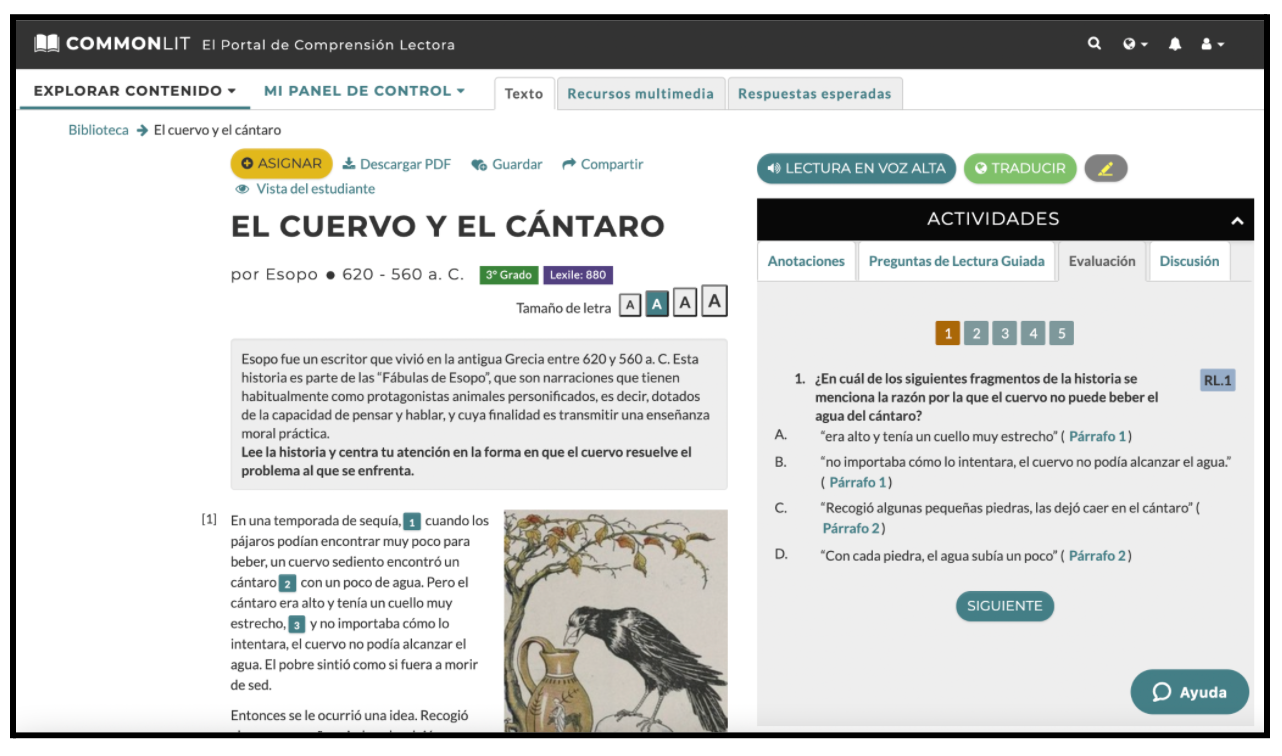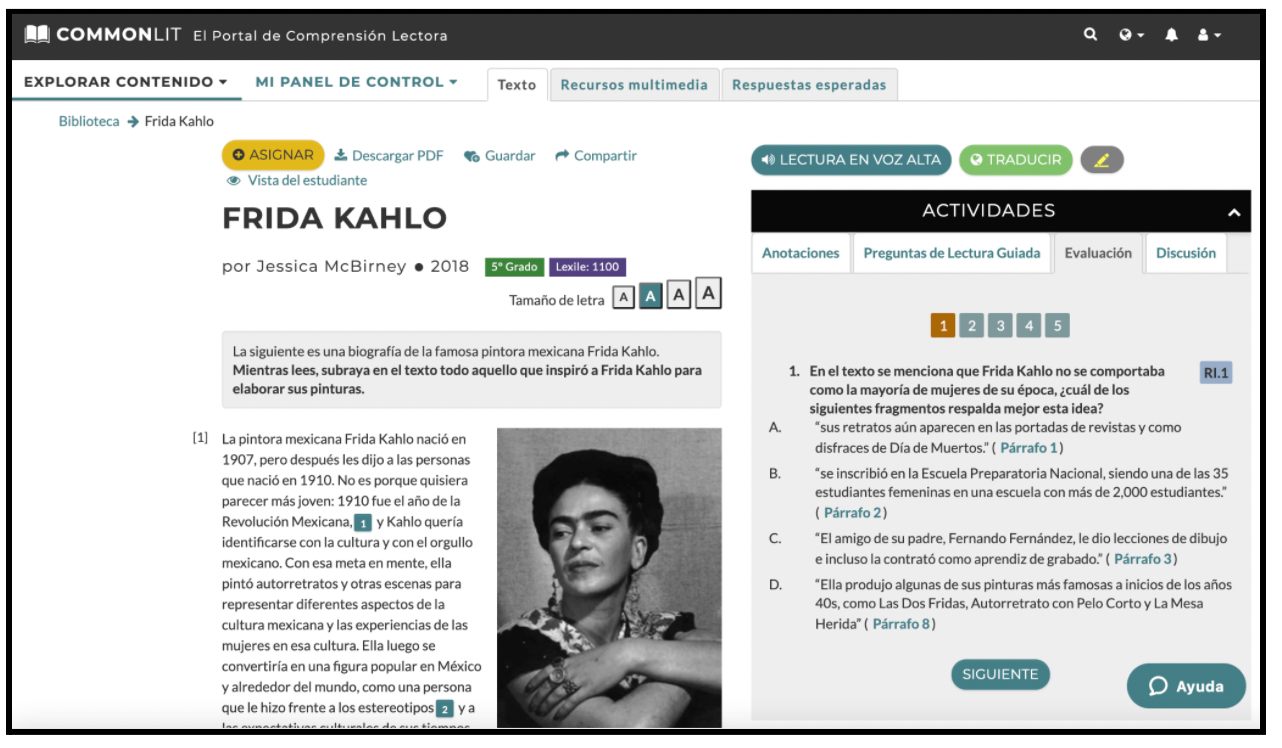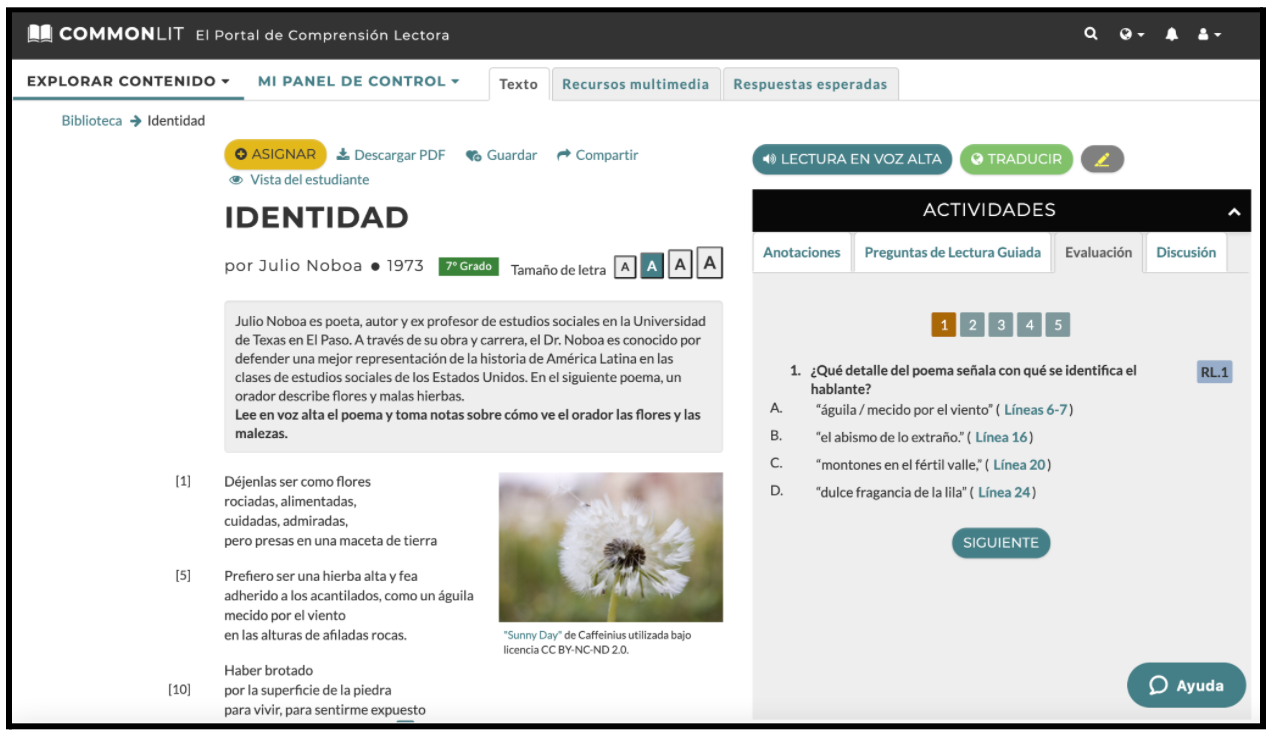Students will love these engaging texts in both languages!
If you’re looking for exciting texts that can be assigned both in English and in Spanish, you’re in the right place! CommonLit’s library currently offers over 200 texts available in both languages. Here are some of our users’ favorites.
Too Many Vegetables / Demasiados vegetales (3rd Grade)
In this short story, Patrick and his dad share a great vegetable harvest with their neighbors. Their generosity is returned when the neighbors cook their favorite zucchini dishes and bring them to Patrick’s house to share! Your students will love this heartwarming story about community.
The Crow and the Pitcher / El cuervo y el cántaro (3rd Grade)
In this fable, a crow comes across a narrow-necked pitcher. Desperate for a drink of water, he begins to drop pebbles into the pitcher to raise the water level. This classic story about a clever bird will make your students chuckle!

Our Creek / Nuestro arroyo (4th Grade)
In this informational text, a group of students called the Standing Stone Creek crew describes how they evaluate the health of a local stream in Pennsylvania. They analyze the water and the land around it to learn more about the environment. This text provides a great opportunity for students to think about ways they can clean up their own communities.
Stop the Hungry Giant Fish / Detengan al hambriento pez gigante (4th Grade)
In this folktale, a giant fish threatens to eat the island of Guam. A determined group of women acts quickly to save their home and, together with the men and children of their island, are able to capture the fish. This story shows that joining with others is a great way to solve problems.
Frida Kahlo / Frida Kahlo (5th Grade)
In this biography, students will learn about Frida Kahlo, a famous painter from the 20th century. Kahlo explored a variety of themes including gender, class, and race in Mexican society through her art. This text is a great way to start a conversation about identity and creativity.

Cobra Kite / La cometa de la cobra (5th Grade)
In this memoir, a girl admires the kites soaring and battling above her village. One day, the characters’ favorite kite is defeated and falls from the sky, and the first one to find it gets to keep it! This text provides a great opportunity to talk to students about happiness and hard work.
Diary of a Teenage Refugee / Diario de una adolescente refugiada (5th Grade)
In this memoir, a 16-year-old Syrian girl living as a refugee in Lebanon recounts her experiences fleeing her home and adjusting to life in a camp. Amira describes the challenges her family faces, like the cost of different goods and feeling homesick. This deeply moving text can be used to start a meaningful discussion about how people are changed by war.
I, Too / Yo, también (6th Grade)
In this classic poem by Harlem Renaissance poet Langston Hughes, the speaker comments on the racial discrimination he faces. He describes his beauty and his conviction that, even in the face of injustice, he, too, is America. Reading this poem is a great way to start a discussion about fairness and exclusion.
A Quick Note on Getting Better at Difficult Things / Una nota breve sobre cómo ser mejores en las cosas difíciles (6th Grade)
In this essay, Ta-Nehisi Coates shares a few personal reflections on how to get better at difficult things. Coates emphasizes that struggling should be normalized, because it feels great to improve at something you weren’t initially good at doing. Students can make connections between Coates’s advice and their own experiences growing as learners.
Watch Out: Cell Phones can be Addictive / Cuidado: los teléfonos celulares pueden ser adictivos (7th Grade)
In this informational text, the author describes how, according to new studies, becoming excessively dependent on your smartphones isn’t smart. Too much phone use can interfere with normal activities and even cause conflict in relationships. This text provides students with an interesting opportunity to debate the benefits and costs of cell phones.
Who was Anne Frank? / Ana Frank (7th Grade)
In this biography, the author details Anne Frank’s experiences as a young Jewish girl during the German occupation of Amsterdam during World War II. Students will be deeply moved by Anne’s experiences during the Holocaust. If you are reading The Diary of Anne Frank with your students, this informational text can be used to introduce the book.
Identity / Identidad (7th Grade)
Why would someone desire to be a weed rather than a flower? In this poem, the speaker imagines a vastly different life. The striking imagery helps students understand the poem’s message about happiness and the choices we make.

Cesar Chavez: His Fight for the Farm Workers / César Chávez: Su lucha por los trabajadores agrícolas (7th Grade)
In this informational text, the author describes the life and accomplishments of Latin American activist Cesar Chavez. Chavez fought against unfair treatment to improve farm workers’ conditions in the United States. This is a great text to incorporate into a unit about people who have made a difference in the world.
Zombies are Real! / Los zombis son reales (8th Grade)
In this informational text, the author discusses how some organisms can infect and control the minds of other insects and animals, creating real-life zombies. Researchers have been studying how parasites can alter the chemicals in their host’s brain. Your students will be fascinated by this engaging scientific text!
Malala Yousafzai’s Nobel Peace Prize Lecture / Discurso de Malala Yousafzai (8th Grade)
In 2014, Malala Yousafzai received the Nobel Peace Prize for her advocacy for equal education. In this speech, Yousafzai discusses her commitment to education. After reading, students can discuss the reasons why they think education is important and make connections to Yousafzai’s reasoning.
Next Steps
Looking for more Spanish texts on CommonLit? Browse the CommonLit Español library!
If you’re interested in learning all about CommonLit’s free Spanish digital literacy program, join one of our upcoming webinars!


